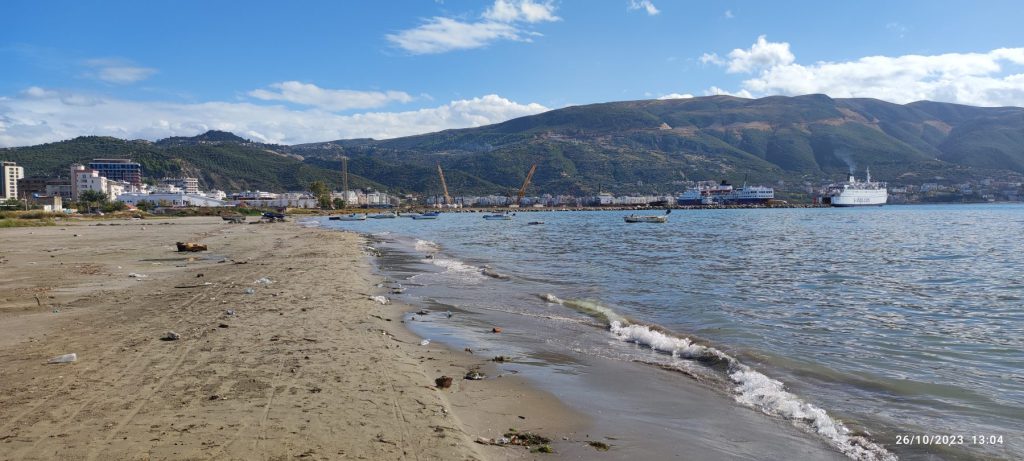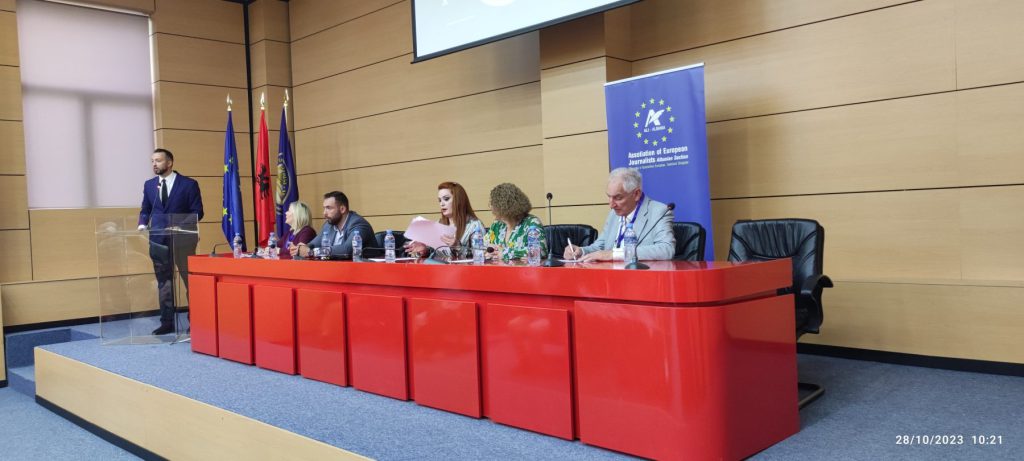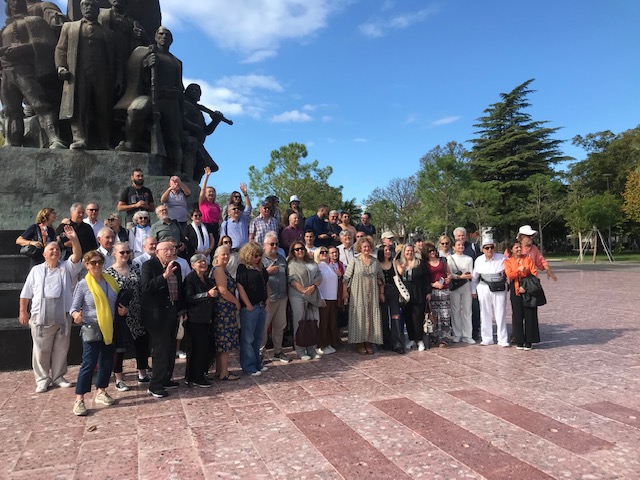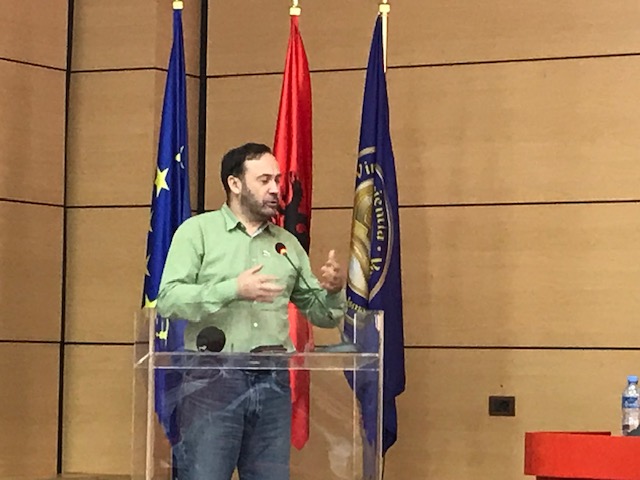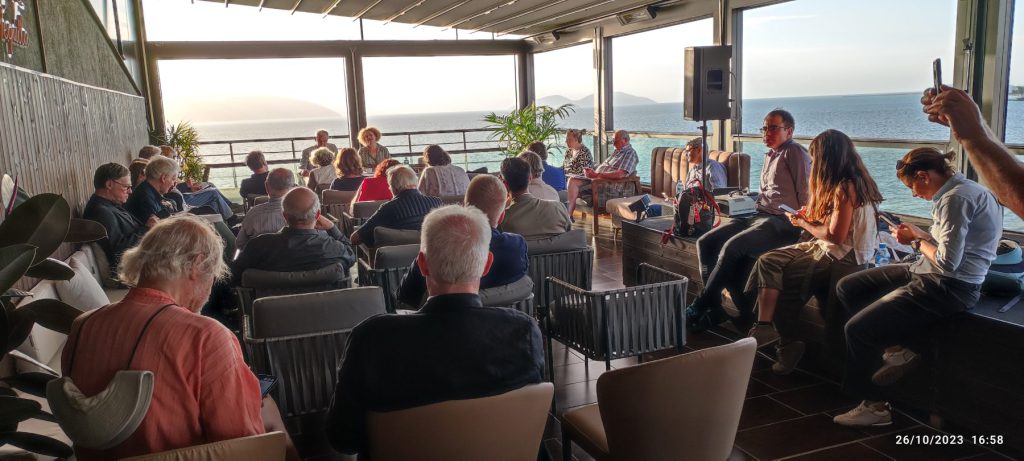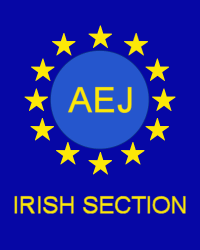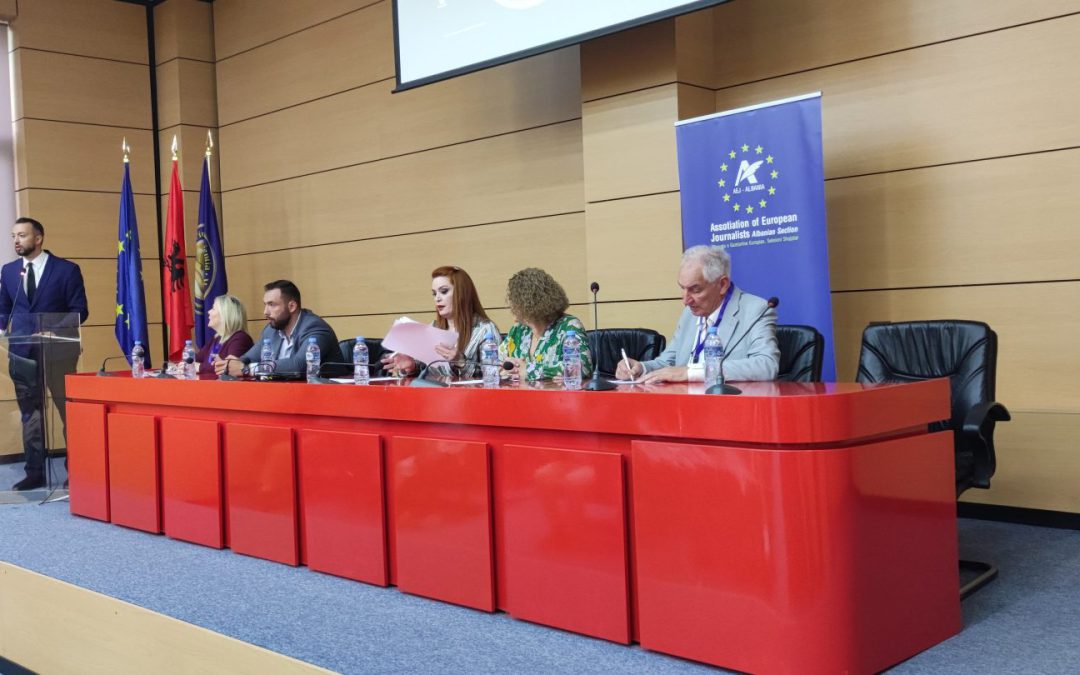By Tim Ryan, Treasurer, Irish Section
EU enlargement in the Western Balkans, the situation in Kosovo and the war in Ukraine were the focus of the Annual Congress of the 2023 AEJ in the southern Albanian city of Vlora from 25 – 28 October. In addition, the question of the separation between journalism and politics and how AI affects journalism were also debated at the Congress. Four delegates from the Irish Section attended among the 60 odd attendance.
In a video message, EU Commissioner Johannes Hahn (Austrian People’s Party) stressed the significance of the European Commission’s new Strategic Growth Plan for the Western Balkans. In areas such as road transport or energy, companies from the Western Balkan states could already participate in the internal market.
The Sarajevo-based Balkans correspondent of the Austrian daily Der Standard, Adelheid Wölfl said Russia had a growing influence in the Balkans. “Many thought that the war in Ukraine would end the questionable appeasement policy of the EU and the USA,” she said. “The opposite was the case.” The EU’s position on Kosovo was also weakened by the fact that five EU States have still not recognised the fledgling Republic of Kosovo. Meanwhile the Kremlin is also trying to destabilise Bosnia-Herzegovina.
The AEJ’s special guest speaker from Ukraine was Ilya Ponomarev, the only member of the Russian Duma who voted against the annexation of Crimea in 2014. He told the congress about the little-known resistance of Russians against Putin. There are already three regiments of Russian soldiers fighting on the side of the Ukrainian army against the Russian occupiers. And he said a separate resistance group in Russia is carrying out sabotage operations and attacks on military installations.
Ponomarev co-founded a shadow parliament of deposed Duma deputies that includes over 100 people and also passes laws for Russia, such as on media freedom and a new electoral code. Its committees and caucuses try to operate as a normal parliament except that it meets abroad.
“Putin must be deposed by force, otherwise this war will continue,” Ponomarev said. “He and his friends are counting on the Russian elite, which is still profiting from Putin’s power. Only when they really lose a lot of money could they also turn against Putin.” The West has made many mistakes, he said. Western companies in Russia, from Ikea to McDonalds, were sold to Putin’s oligarchs at dumping prices.
Ponomarev told the congress that parts of the US government and many EU politicians were still hoping for a ceasefire in Ukraine. But as long as Putin remained in power, peace negotiations would serve no purpose because they would only support Putin’s goal of permanently annexing at least parts of Ukraine to Russia.
Austria, he said, had meanwhile become “Putin’s most important ally in the EU”. “From the gas supply contract with Gazprom to the planned broad-gauge railway connection to the friendship treaty of the Austrian Far Right party FPÖ with Putin’s party United Russia, Putin has his fingers in everything. And Vienna, he said was still a main centre for Russian espionage. The former Yukos executive now runs a Russian-language TV channel on YouTube to inform Russians about the war in Ukraine. About 20% of Russians regularly consulted alternative media, he said.
The question of the separation between journalism and politics was also debated at the Vlora Congress. In Bulgaria, the head of the largest private Bulgarian TV station, BTV, was nominated as a candidate for mayor in the capital Sofia just before the municipal elections recently by Boyko Borissov’s Gerb party, which was voted out of office. For Irina Nedeva, head of the Bulgarian Section of the AEJ, this was “a problematic candidacy”.
In Romania, the editor-in-chief of a sports newspaper was recently fired for allegedly refusing to report positively on sports betting offices. The newspaper belongs to the Swiss Ringier publishing house.
In Albania, a prominent journalist who was bribed by a businessman was convicted through a hidden video recording. “We have lost a lot of trust among the Albanian population. We need regulations for the ethics of our profession,” said Arber Hitaj, head of the AEJ’s fast-growing Albanian section. “Sixty percent of private TV stations receive money from municipalities or political institutions,” he said. With a population of 2.8 million, Albania has 67 TV stations, which is certainly too many. And there are no regulations at all for social media.”
“The EU has behaved a bit crazy towards Albania,” complained Ervin Demo, Social Democratic mayor of the city of Berat at a briefing with AEJ members in his home town. “First, we had to wait six years for negotiations to start. Then every year we were presented with new conditions on what new reforms we would have to do beforehand. We need a clear signal from the EU that it really takes the Western Balkans seriously.”
Finally, one of the most eye-opening presentations to the congress on the universal dilemmas being unleashed by the rapid deployment of artificial intelligence (AI) were from Llewellyn King of the White House Chronicle and a video presentation from Bill Stathopoulos, CEO of Madbold. Chilling stuff, particularly the forecast by Llewellyn – in a fluent presentation without notes – that AI would cause the loss of up to 300 million mainly low skilled and low paid repetitive jobs worldwide with unpredictable but dire human and political consequences.
